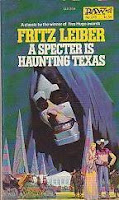It’s quite easy to feel that today’s political climate is a circus. Reality tv stars in the white house and a cacophony of opinions flooding media, there are moments we feel like observers to a road show. If only it weren’t reality. But fear not; it’s not the first time. Looking back to the 60s, there likewise were extreme views across the spectrum and something of a road show happening at the top. Hippies, Watergate, Vietnam, the onset of disco… it was also strange times. Capturing some of this oddity in a science fiction satire is Fritz Leiber’s novel A Specter Is Haunting Texas (1968).
A Specter Is Haunting Texas is the bizarro story of Scully La Cruz, and his return to Earth to collect on his family’s mining holdings in Yellowknife. A lot having changed in their absence, Yellowknife is no longer Canada. Texas has asserted itself and taken over the majority of the western world, creating a pot-puffing, traditionalist, capitalist empire in the process. Mexicans provide cyborgized labor and leaders push women to the rear, sipping whiskey and puffing joints all their nepotistic way. Scully wears a large metal exoskeleton such that his frail body can survive Earth’s gravity. When landing in Texas, he is taken as a god by the locals, but a longhair, a hippy-esque space colonist by Texans. A tug of war over his political interests ensuing, it’s no guarantee Scully will ever find his way to Yellowknife and reclaim his holdings.
The outward characteristics of A Specter Is Haunting Texas are wholly sci-fi. Exoskeletons, alternate national boundaries, speculative forms of government, solar colonization, blaster weapons, remote-controlled humans, and the list goes on. There is no doubt which genre the novel falls into extrinsically. Intrinsically, however, there is more happening. Scully is a trained actor—a skill he comes to rely on in order to navigate the various groups which would seek to use him for political purposes. I will not spoil things except to say Leiber does not let the metaphor of theater go unused.
But the strongest intrinsic element—undercurrent of theme—is a ridicule, an outright roasting of political cronyism. Nothing hidden, Leiber pokes a hole in the water bag of politics the likes of which Richard Nixon, Lyndon Johnson, and other Texas politicians have displayed. Leiber’s tone appropriate throughout, Scully perpetually exists in veiled sarcasm. Adding a complementary layer is that the mode of the novel is the classic Western. Undoubtedly there are some who would be critical of Leiber’s depiction of women, but this does not appear due to inherent discrimination, rather that Leiber wants to play off the classic tropes of John Wayne, Louis L’Amour, and the rest. The simplistic absurdity of, for example, the love triangle which arises, is not a traditionalist objectification of women in fiction, rather Leiber highlighting how farcical the setup which gave rise to said triangle, is.
A Specter Is Haunting Texas is not perfect. Wordplay is always fresh, and the sense of fun and satire is replete, but plotting tends to be a bit loose. While it can be argued this a complementary aspect (‘rigid’ and ‘satire’ are not always harmonizing), it nevertheless feels to wander a bit too much at times. Scully’s return to Yellowknife to reclaim his family’s holding remains the light at the end of the tunnel throughout, but the path taken is wide and curving.
Leiber is sadly overlooked by a lot of readers today. His Fafhrd and Grey Mouser stories seem to remain alive in some fashion, but they are what paid his bills, mainstream genre through and through. His more sophisticated works, in which I would include A Specter Is Haunting Texas, seem to have almost entirely faded. Which is a shame. Given the political climate today, A Specter Is Haunting Texas feels at home despite the differences in era. Trump is not from Texas, but his good ol’ boy network of cronies and closed mindset to even a semi-progressive view to society fits right in here. All in all, if you like Norman Spinrad, Brian Aldiss, J.G. Ballard and other writers who enjoy playing political games constructed of science fiction material, you will do well to try this overlooked novel.


No comments:
Post a Comment